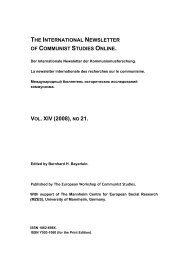11RXNdQ
11RXNdQ
11RXNdQ
Create successful ePaper yourself
Turn your PDF publications into a flip-book with our unique Google optimized e-Paper software.
Colonialism and Neocolonialism 90<br />
labour. It was attempting to interest the peasant in production and encouraging individual<br />
ownership of property. Patrice regarded his father’s poverty-stricken independence in the<br />
solitude of the Congolese countryside as a natural state: far from being responsible for it,<br />
the whites were nice gentlemen who would rescue him from it. He must have been given,<br />
at about this time, some strange explanations of his situation: the Christian faith was the<br />
dues young Congolese made to the Churches who taught them to read. The Fathers gave<br />
him a burning ambition to understand the causes of his misery, and, at the same time, the<br />
desire to resign himself to it. He later noted this contradiction in a poem:<br />
To make you forget that you were a man<br />
They taught you to sing God’s praises<br />
And these diverse hymns, setting your Calvary to song<br />
Gave you the hope of a better world<br />
But in your heart of a human creature, you scarcely<br />
demanded more<br />
Than your right to life and your share of happiness.<br />
Religion prostrates at the same time as it liberates. And then it offers salvation, and<br />
although a better world is only an alibi, they are obliged to teach that one can enter it<br />
thanks to merit and not according to the colour of one’s skin. However hard many priests<br />
try to hide it, the egalitarianism of the Gospel retains its undermining effect on the<br />
colonies. It affects not only the catechumens but also the missionary himself, sometimes:<br />
either because they wanted to forestall a Socialist Party congress in Belgium, or out of<br />
conviction, or perhaps a mixture of both, in 1956 the Scheut missionaries approved a<br />
manifesto drawn up by Ileo, a 37-year-old évolué who called for independence – in the<br />
long term – for the Congo. The departure of the 18-year-old Patrice from the bush for<br />
Kindu, where the Symaf company took him on as a ‘book-keeper’, was part of the<br />
generalized rural exodus, and also the crucial stage in his developing consciousness. A<br />
young peasant who had read Rousseau and Victor Hugo suddenly encountered the town;<br />
his standard of living was radically transformed. He used to go to school in a loincloth;<br />
now, he went to work in a suit. He had lived in a hut; now he lived in a house and was<br />
earning enough money to buy and fetch Pauline, his Mututela fiancée, who became his<br />
wife. He worked frenetically. The whites claimed to be surprised by his zeal: the<br />
Congolese, they said, are usually lazy. But these obtuse colonists did not understand that<br />
the famous ‘laziness of the native’, a myth upheld in all the colonies, is a form of<br />
sabotage, the passive resistance of the peasant or exploited worker. Patrice’s frenzy, in<br />
contrast, placed him for a time in the category of those whom he was later to call<br />
‘collaborators’. The peasant’s son was now an évolué; he applied for a ‘registration card’<br />
and obtained one with difficulty – there were only 150 of them in the whole country –<br />
thanks to the intervention of the whites: in other words, he was betting on them; he had<br />
realized his importance, that of the young ‘elite’ which was forming everywhere. The<br />
évolués formed a social stratum which was slowing expanding and providing<br />
indispensable aid to major businesses and the Administration. As a black, Patrice




